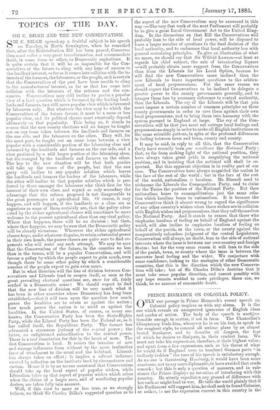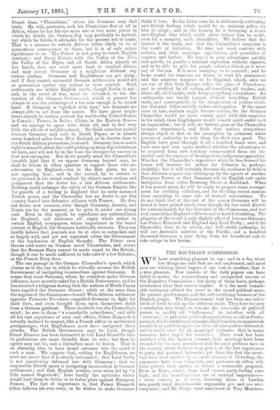PRINCE BISMARCK ON COLONIAL POLICY.
ONLY one passage in Prince Bismarck's recent speech on Colonial policy inspires us with any alarm. It is the one which reveals an unexpected ignorance of English ideas and modes of action. The body of the speech is unobjectionable enough in matter, if not in form. The Chancellor's idiosyncrasy leads him, whenever he is on his feet, to speak in the roughest style, to conceal all serious plans by an almost brutal frankness, and to describe all dangers, the fear of which he desires to dissipate, in their crudest form. We must not take his expressions, therefore, at their highest value; and apart from a few expressions, such as his threat of what he would do if England were to bombard German ports " in ruffianly fashion" the tone of his speech is satisfactory enough. As no one is threatening Hamburg, it would have been more courteous, not to say more diplomatic, to have avoided that crude remark ; but this is only a question of manners, and in substance the Prince displays no intention of interfering with this country. He utterly repudiates any ground of difference with her such as might lead to war. He tells the world plainly that if his Parliament will support him, he shall seek to found Colonies, or rather, to use the expression current in this country in the
Stuart time, "Plantations," where his Germans may find trade. He will, moreover, seek his Plantations first of all in Africa, where he has his eye upon one or two more places in which he thinks the German flag may profitably be hoisted, but which he thinks it advisable for the present not to name. That is a menace to certain African tribes likely to be of momentous consequence to them, but it is of only minor significance to us. The Prince is not going to touch English territory ; and Great Britain, with the Valley of the Nile, the Valley of the Niger, and all South Africa already on her hands, does not want more land in tropical Africa, and may accept Germany as a neighbour without any serious qualms. Germans and Englishmen can get along ; and if they cannot, successful German settlements would act as guarantees against any serious or open quarrel. Such settlements are within English reach, though Berlin is not ; and, in the event of war, must be defended, to the distraction of the German Government, which at present has always in war the advantage of a foe near enough to be struck hard. If Germany is "girdled with foes," her Generals are always able to act from the centre. We have great neighbours already in various parts of the world—the United States, in Canada ; France, in India ; China, in the Eastern Seas— and we manage to agree with them all, and to feel very little the effects of neighbourhood. To think ourselves ruined because Germany may rule in North Papua, or in islands seven hundred miles from New Zealand, or in deserts close to our South African possessions, is absurd. Germany has as much right to stumble about the world picking up stray dependencies as we have, and will not be in the least the stronger for success in that new enterprise. Nor do we greatly mind the Chancellor's irascible hint that if we oppose Germany beyond seas, he shall be driven in other quarters to support those who are adversaries to England,—for, in the first place, we are not opposing him ; and in the second, he is certain to be governed in his actual conduct by objects more serious and permanent than the desire for a few African settlements. Nothing could endanger the safety of the German Empire like the growth of a feeling in England that its unity menaced British peace, and the Chancellor has no desire to see this country forced into defensive alliance with France. He does not desire new enemies, even though Germany, Austria, and Russia are for the moment, as he puts it, under one strong roof. Even in this speech he repudiates any unfriendliness for England, and addresses all angry words rather to certain English newspapers, whose importance in the broad current of English life Germans habitually overrate. They can hardly believe that journals can be at once so outspoken and so largely sold, and yet not represent either the Government or the tendencies of English thought. The Prince even throws cold-water on German naval Chauvinism, and avows that the German Navy cannot be made equal to the British, though it can be made sufficient to take care of a few Colonies, as the French Navy does.
The one passage in the German Chancellor's speech which alarms us is the one in which he virtually accuses the British Government of instigating insurrections against Germany. It seems that some Samoans, whom he considers under German influence, have recently asked for a British Protectorate, and he has received a telegram stating that the natives of North Papua have expelled the Germans thence ; while at the same time the negroes of the Cameroons—horrid West-African settlement opposite Fernando Po—have compelled Germans to fight for their lives, and even brought down upon themselves shells from a German gunboat. These incidents vex the Chancellor's mind ; he sees in them " a remarkable coincidence," and with all his vast experience of men and affairs, Prince Bismarck is actually inclined to suspect, like a French editor or an Oriental gossipmonger, that Englishmen must have instigated these attacks. The British Government may be loyal, though Count Munster has been instructed to tell Lord Granville that its professions are more friendly than its acts ; but then its agents may not be, and a distinction must be drawn. That is an alarming idea to have found entrance into the mind of such a man. We suppose that, writing for Englishmen, we need not assert that it is utterly unfounded ; that Lord Derby is not sanctioning informal war with Germany ; that no responsible British agent is instigating insurrection in German settlements ; and that English settlers, even when led by "a Pole named Rogozinski," have hardly the aptitudes which would lead them to devise or to foster plots against European Powers. The fact of importance is, that Prince Bismarck either believes his own story, or he wishes to make Germans think it true. In the latter ease, he is deliberately cultivating anti-British feeling, which would be au ominous policy for him to adopt ; and in the former, ho is betraying a secret anti-English bias which could alone induce him to credit, even for a moment, such absurdities. We believe that the former is the truth, and that the Chancellor's suspicion is the result of irritation. He does not want contests with natives, and little maritime expeditions, and quantities of expense and bother. He hoped to gain advantages quickly and quietly, to gratify a national aspiration without expense, and to be able to give his people colonies fished, as it were, out of the sea. It is most annoying to be resisted ; and he looks round for someone on whom to vent his annoyance, and the someone happens to be England, which, once we are out of this little Europe, takes the place of Providence, and is credited by all sailors, all travellers, all traders, and, above all, all Consuls, with doing everything everywhere. An earthquake can hardly happen without benefiting British trade, and consequently, in the imagination of jealous rivals, the Colonial Office secretly orders earthquakes. If the mood were to last, matters might become serious, for the German Chancellor would no more remain quiet with this suspicion in his mind, than Englishmen would remain quiet under such an imputation ; but it will, we believe, pass as the Chancellor becomes experienced, and finds that natives everywhere always object at first to the assumption by unknown white persons of authority to rule them for their own good. The English have gone through it all a hundred times over, and have over and over again doubted whether the advantages to be acquired from new territory compensated them for the trouble and the expense of beating-down indigenous opposition. Whether the Chancellor's experience when he has learned his lesson will increase his ardour for Colonies is, perhaps, doubtful; but it will certainly decrease his readiness to believe that Africans require any stirring-up by the agents of another European Power, or that Samoans ask for English rule under instigation from either Downing Street or Auckland. When it has passed away, he will be ready to propose some arrangement for avoiding collisions, and for dividing recent annexations according to some rule of mutual convenience. We do not think that at the end of the scurry Germany will be found to have gained much, even though she has voted £9,000 for a steam-launch for the Governor of the Cameroons, and feel well assured that England will be found to have lost nothing. The piogress of the world is only slightly affected because Germany has Prince Bismarck and England only Lord Derby ; and if the Chancellor lives to be ninety, and still wields authority, ho will see Australia mistress of the Pacific, and a hundred thousand Germans a year flying from his beneficent rule to take refuge in her bosom.



































 Previous page
Previous page